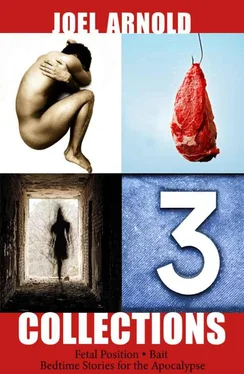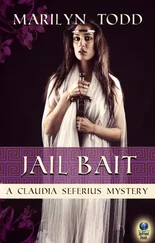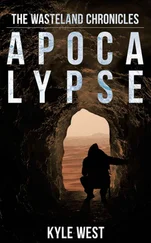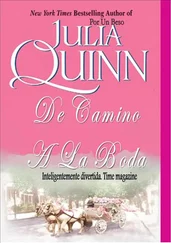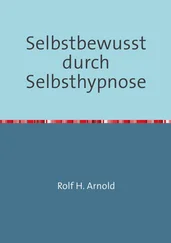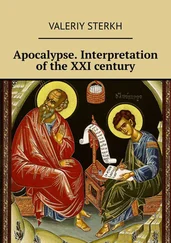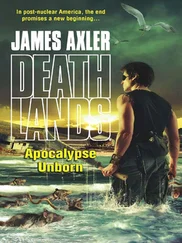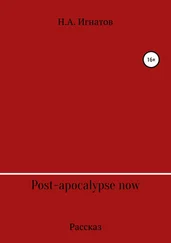“Do you love your country?” the man barked. “Do you love your country?”
Harvey stumbled for a reply, feeling the hot dog rise in his stomach.
“Don’t let your hesitation give me the answer,” the man said, his eyes boring a hole through Harvey’s retinas, through his bleached irises, lighting his brain on fire.
Red-orange fire .
The heat in Harvey’s brain was a wonderful feeling. A wonderful color. It warmed Harvey’s mind, sparking off of the metal plate in his head.
“Do you love your country?” the man asked again, grabbing Harvey’s shoulder, digging in with hard fingers.
The pain shot more fire into Harvey’s brain and flashed through his eyes.
“Yes!” Harvey cried. “I love this country more than anything. More than life. More than my mate. More than my children.” Harvey sneered. “I love this country even more than death .”
“Then give me that book,” the man demanded, his buttoned-up trench coat bulging with the promise of a quick, violent end.
Harvey ran his fingers over the cover of the book, feeling the indentation of the word COLOR ripple under his skin. “I won’t look at it again,” Harvey said. He looked sheepishly into his lap. “”I’ll keep it shut.”
“Give me the book and this will be forgotten.”
Harvey slowly handed the book over. The man grabbed it and threw it on the concrete. He produced a vial from one of his many pockets and poured a clear liquid over the book’s surface. It immediately smoked and spit, the acid disintegrating the cover, then the pages, leaving nothing but a pulpy slush.
“I ought to make you lick that up,” the man said. He turned and started to walk away.
“Wait!” Harvey shouted. He stood up. The man stopped and turned.
“I love this country more than anything.” Harvey took a step toward the man. “I love this country more than life. More than my mate.” A sneer grew on Harvey’s face. “More than my children.” Harvey took a giant step and stood looking up into the man’s eyes. The smoke in them began to clear.
“And I love this country more than death! ” Harvey cried as he threw his arms around the man, hugging him tightly.
The man was caught by surprise — Harvey felt it. The red-orange glow in his brain told him so.
“Quack!” Harvey said.
“Quack?” the man said.
“Quack!” Harvey said as he reached into the man’s trench coat and wrapped his fingers around cold metal, squeezing it as fire raged through his brain. Red-orange. The color the sun should be , Harvey thought. The color of fire.
Squeeze . A charge went off, filling the man’s nose, Harvey’s nose, as the man slumped forward. Harvey let him drop and heard the crunch of a hundred glass vials as the man hit the concrete. He began to smoke and spit, bubbling, dissipating into the air, becoming nothing more than a vile odor.
Harvey sneered and walked to the edge of the concrete encased lake. He watched the oil swirl and dance, the colors bleeding into each other endlessly.
Working Class Hero Worship
I’ve got a secret to tell you.
I can sing you songs you were never meant to hear. They were his songs. Beautiful songs. I’m the only one alive who’s ever heard them.
Here’s another secret. Mark David Chapman did not kill John Lennon.
This is what I know.
Listen.
I see his breath rise in front of his eyes. Feel the chill in Chapman’s face, his beating heart. I see through his eyes. Hear with his ears, feel with his skin. I smell Central Park, I smell sweat and excitement through his nose. I hear the voices in his head.
The gun is heavy in his pocket, a five-shot short barrel .38 caliber Charter Army Special containing five hollow-point bullets. I know that unless I stop him, unless I can fight through the legion of voices in his head and take control of his body, four of the bullets will hit their intended target, rip apart his body as if it were a piñata, and end the life of one of the greatest songwriters in the world. The voice of a generation.
I have to take control.
I have to stop him.
A white limousine pulls up. A woman steps out. A woman I recognize. Black hair cropped short over a complexion of cream-kissed coffee.
Then he steps out.
The man I’ve idolized since the age of ten. The man whose music, whose voice, whose words and actions have become almost a religion to me.
The body I’m in reaches a chilled hand into its coat pocket, wraps its fingers around the dense metal of a gun.
“ Mr. Lennon.”
The words are out before I can stop them.
I have to take control.
Concentrate. Make his fingers move.
Concentrate .
It’s like trying to bend steel.
Lennon turns.
I recognize his glasses from the cover of Season of Ice . On the album’s cover, they are still coated with his blood.
The skyrockets going off in Chapman’s mind nearly overwhelm me. His arm rises with the gun.
Concentrate. Push.
I have to stop him. I must.
If you’re old enough, I bet you remember exactly where you were when you heard that Kennedy was shot, the moment deeply chiseled in your heart.
But that was before my time.
My milestone of shock and grief happened on a cold December night in 1980. I heard the news during a football game. Howard Coselle, of all people, made the announcement.
John Lennon had been shot.
It hurt to breathe. It hurt to think. It couldn’t be true. It couldn’t. Life stopped as I lay in bed that night, my heart beating painfully in my throat. John Lennon was a singular voice of honesty and clarity and intelligence in this world, and now he was gone. The earth seemed to falter in its rotation, as if it, too, wasn’t sure how to proceed.
But even the worst effects of tragedy become malleable over time. The immediate hurt turns to a dull pain turns to an emptiness evoked by things like anniversaries and songs heard on the radio.
And my talent remained.
My talent.
It used to frighten me. Images slid unbidden into my head. Images from nowhere, it seemed, distorted and dim and confusing. As a child, my schoolwork suffered. Why did my mind wander? Why wasn’t I paying attention? Eventually, the images became clearer. Cohesive.
Like—
Mr. Marpoli, my third grade teacher; images of his affair with Mrs. Cravitz, the Kindergarten teacher.
Like—
Images of the undulating webs of Ms. McKay, my fourth grade teacher, as she battled with demons who quietly insisted she hang herself.
Like—
—the assistant principal, Mr. Olaf; I felt the guilt he suffered, saw it as a slow-turning pinwheel of crimson-tinged blue. The guilt he felt for offering a janitor twenty bucks to suck his cock. The janitor threatened to tell Olaf’s wife if he didn’t pay him two hundred dollars to keep quiet.
I learned to control whose head I was in. If I focused, if I concentrated, I could be there in moments.
December, 1980. John Lennon was back in the public eye after five years of caring for his son Sean. Double Fantasy was released and was an immediate success. Once again, John Lennon was on top of the world. He seemed so happy this time around, so full of hope and excitement. Maybe that’s what made his death that much harder for so many of us. The world was anticipating so much more of his music.
But that night — December eighth, 1980.
“Mr. Lennon?”
Lennon turns, his face flush and happy after a night in the studio. Chapman’s arms rise, both hands on the gun now, and Lennon squints at the gleaming metal object aimed at him.
My talent. I practiced. I learned to focus. It got me through those tough months, those months of shock and grief that followed the death of the one person I’ve never been ashamed or embarrassed to call a hero. It filled part of the void left within me.
Читать дальше
